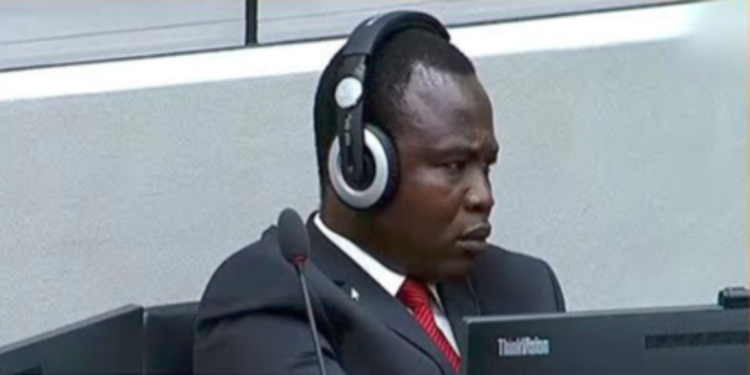By Tom Maliti
A former aide to Joseph Kony, leader of the Lord’s Resistance Army (LRA), told the International Criminal Court (ICC) that about eight years ago the Ugandan army ambushed a unit Kony led in north-eastern Congo, but Kony evaded capture.
Kenneth Oyet told the court the ambush happened sometime in 2010 when the unit Kony led was in a place called Doruma, which is close to the border with Sudan’s then autonomous region of Southern Sudan. (This region became the Republic of South Sudan in 2011.) Oyet said he left the LRA after this ambush.
Oyet’s testimony on November 5 was the first time in the trial of Dominic Ongwen, a former LRA commander, that a witness had testified about how close the Ugandan military got to capturing Kony. There is an outstanding ICC arrest warrant for Kony issued in July 2005. This was the same time that an ICC arrest warrant was issued for Ongwen; that arrest warrant remained outstanding until Ongwen surrendered in January 2015.
Ongwen has been on trial since December 2016 on 70 counts of war crimes and crimes against humanity that he allegedly committed between July 2002 and December 2005 in northern Uganda. He has pleaded not guilty to all counts.
Testifying about the 2010 ambush, Oyet said on that day they had walked for about one and a half miles and they were somewhere between Doruma and a place called Nzara in Sudan when Kony ordered them to stop.
“He selected four of us and asked us to move ahead and check if the road is clear and find out if there are soldiers or not,” said Oyet. He said some time after the four of them went ahead, soldiers of the Uganda People’s Defence Forces (UPDF) started shooting at them.
“Kony had stayed back for about a mile or more away from us. When they (the UPDF) started firing at us, they (Kony and the rest of the unit) were far away,” said Oyet. He said Kony and the other members of the unit that remained with him got away.
Oyet said he was shot during this ambush and got separated from the other three LRA fighters he was with. Oyet said when he was shot, he fell, and he decided to lie low for some time. He said it was at this time he decided to escape the LRA. Oyet told the court that after he had rested, he tracked the UPDF soldiers who had ambushed them.
“I met them shortly thereafter and I handed myself to UPDF soldiers,” said Oyet.
Prosecutor Adesola Adeboyejo cross-examined Oyet about his decision to leave the LRA. She asked him whether he would agree with her, “more people left the bush because of amnesty than any other reason?”
“That’s correct,” answered Oyet.
“And this was because they heard people over the FM radio talking about the amnesty?” asked Adeboyejo.
“That’s correct,” replied Oyet.
Adeboyejo then asked whether when people in the LRA heard “former comrades” on the radio, “you all realized that amnesty was real?”
“Yes,” said Oyet.
“And so, this was what gave you the courage eventually to make the decision to hand yourself over when you were injured?” asked Adeboyejo.
“That’s correct,” answered Oyet.
When Adeboyejo finished cross-examining Oyet, Abigail Bridgman, one of Ongwen’s lawyers, asked him further questions in re-examination.
“Why did you not leave the LRA as soon as you heard about the amnesty?” asked Bridgman.
“The reason why I stayed in the LRA was because it was extremely difficult to leave. One, you had also to think about your life … If you decide to up and go without any thought, then you are risking your life,” replied Oyet. Earlier in the day, Oyet told the court the LRA abducted him from his village in 1994.
Bridgman then read to him an excerpt of his statement in which he said amnesty was meaningless if the LRA were able to go to your village and destroy it in retaliation for you leaving the group.
“Yes, that’s accurate because if you escape to the area where you originate from, they will go to the area. There will be repercussions, they (the villagers) will be killed,” Oyet answered.
Oyet concluded his testimony on November 5. A transcript of his testimony is available here.
This article was first published on the International Justice Monitor







